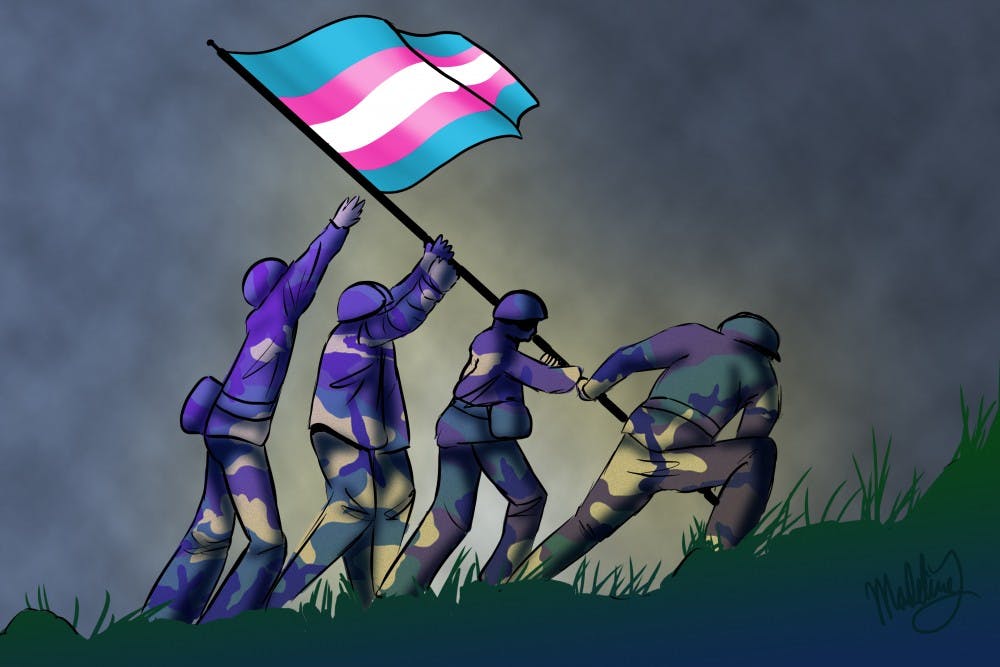To be able to fight for your country is an honor and a right that should be granted to every citizen of the U.S.
President Donald Trump, a self-proclaimed LGBTQ supporter, announced his decision on Twitter to reinstate the transgender military ban on July 26. The directive reinstating the ban was signed by the President on Aug. 25. Former President Obama had rescinded the ban, which had taken away the right to serve for transgender citizens.
The ban will greatly affect not only the transgender community in the military, but also the transgender community at ASU. This decision can easily create the type of environment that will make many students feel alienated and unsafe.
“I feel concerned, because it’s reflective, I think, of the direction in which the U.S. appears to be headed, which is backwards,” Julia Himberg, an openly gay film and media professor at ASU and acclaimed LGBTQ author said. “It is a form of regression that is going to really potentially re- entrench forms of discrimination that many activist organizations and others have been working to eliminate.”
Trump's tweets claim that the reasons behind the ban include the “tremendous” medical costs and disruptions that having transgender people in the military would entail. However, the President failed to include any numbers or statistics to back up his claims.
According to the RAND Study, a defense department-commissioned study, having transgender people in the military would increase health care spending by, at most, 0.13 percent. This is not significant enough of a number to be the reason why Trump would ban transgender people in the military.
Trump has claimed that he is an ally of LGBTQ groups. Oddly enough, since starting his term, he has done nothing to actually further the LGBTQ movement.
In fact, the only move Trump has made in regard to the LGBTQ community excluding the ban is withdrawing the Title IX guidance for transgender students in February, a statute meant to better school environments for transgender students by securing their safety.
Although this pertains to K-12 education, it impacts college students just as much.
"It affects colleges as well. Yes, the focus is on K-12 education, but the Title IX is something that protects university students and that is something that didn't get a lot of attention," Himberg said.
This decision is more than just a ban; its consequences speak to the government's hand in transgender activism and will negatively impact the progress that the transgender community has made.
“It’s part of a larger conversation with regards to where this particular White House sits in relation to transgender communities which is an antagonistic space," Mathew Sandoval, Faculty Fellow at Barrett, the Honors College, and human rights activist, said.
"Whether it’s the military or whether it’s bathroom access, it’s always going to be the antagonistic relationship and that’s the thing that needs to be questioned.”
However, the response to the ban has been varied across different LGBTQ groups. Some transgender soldiers are suing the government and are ready to fight the injustice, while others would rather pick their own battles, as this is not the sword they want to fall on.
“Not everybody is looking to get into the military," Sandoval said. "There are plenty of people in the transgender community who have a very certain political world view in regards to U.S. military involvement. Not all transgender people feel like the steps they need to be making in terms of equality in this country needs to happen within the confines of the military.”
These actions are not the actions of an ally. The only actions President Trump has made in regard to the LGBTQ community have been acts of injustice and prejudice. Neither of these decisions benefit Americans in any way; they only put transgender people at a disadvantage.
The medical cost of transgender people being in the military is not significant enough to be a valid reason for banning soldiers and the only disruption would come from a place of transphobia, something we should be trying to discourage, not support.
"We have a very large population of students who, in some way, identify under the umbrella of transgender. It has the potential to create an environment where students aren't confident that they will be protected," Himberg said.
We, as a country, should be looking to be more inclusive, but banning transgender people from the military for invalid reasons is not a step in the right direction.
Unfortunately for future students in the LGBT community, the outcome of this ban is unpredictable and could foster an unwelcoming environment in all walks of life.
Reach the columnist at jlferrig@asu.edu or follow @Jess_Ferrigno on Twitter.
Editor’s note: The opinions presented in this column are the author’s and do not imply any endorsement from The State Press or its editors.
Want to join the conversation? Send an email to opiniondesk.statepress@gmail.com. Keep letters under 500 words and be sure to include your university affiliation. Anonymity will not be granted.
Like The State Press on Facebook and follow @statepress on Twitter.




